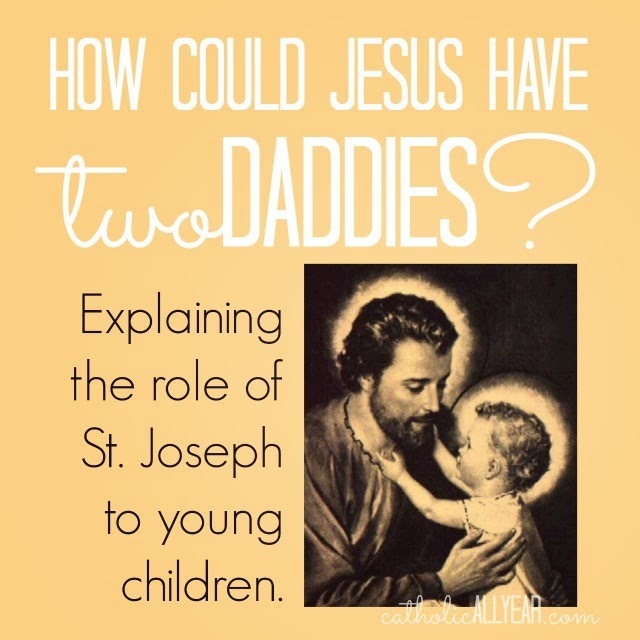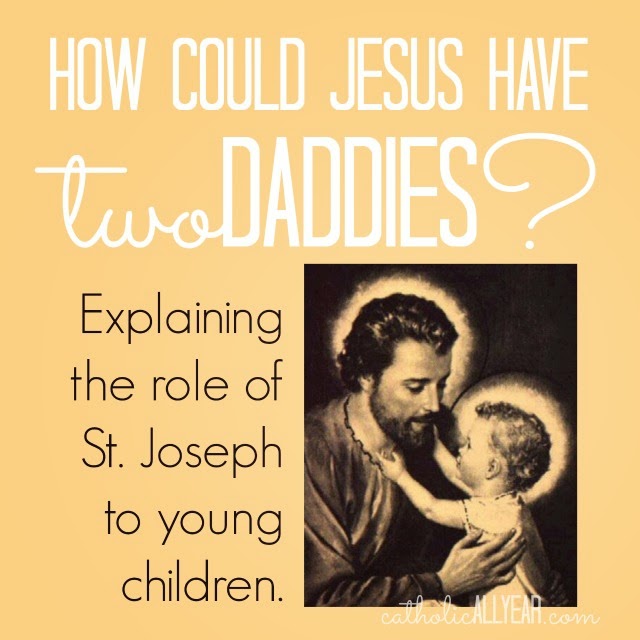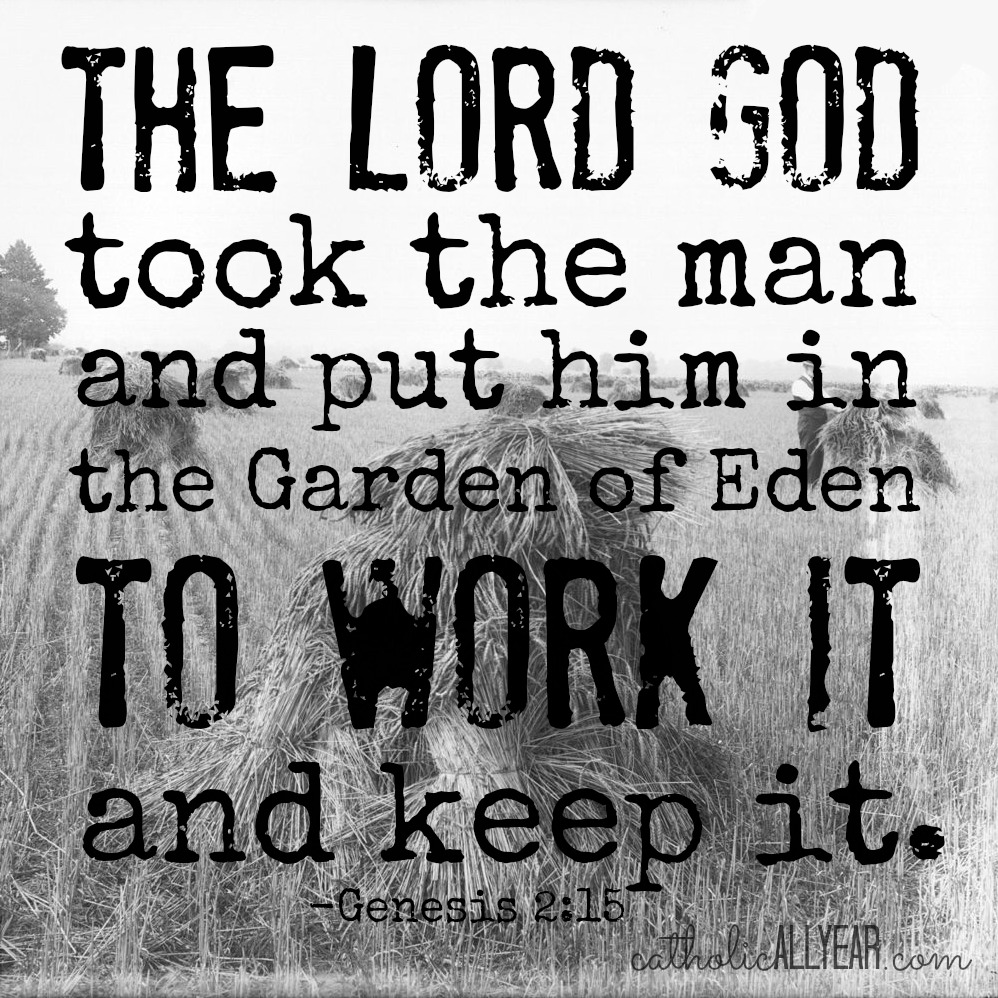Today is the feast of St. Joseph the Worker. And I just happen to have a mailbag question that is particularly well-suited to the day.
Let’s get to it, shall we?
the question:
Dear Kendra,
the answer:
Sarah,
Like you say in your question, in our family we haven’t had particularly complicated family relationships that we have had to explain to our kids. So for them, mom + dad + baby = family. It can be confusing to understand how to balance the roles of St. Joseph and of God. But, really, in a very profound way, like Jesus, each of us has both a father on Earth and a father in heaven.
We often hear St. Joseph referred to as the “guardian” or “foster father” of Jesus. But I think that’s more confusing and not as accurate as calling him Jesus’ adoptive father a.k.a. his father. Jesus is of the line of David, a lineage he gets from being Joseph’s son. Joseph isn’t just playing a role, he isn’t just looking after him like a bodyguard. He is Jesus’ actual no kidding father, just as much as any other adoptive father would be. That is to say, completely.
God (in the person of the Holy Spirit) is, of course, Jesus’ biological father. But since delving into what it means to be a biological father is probably not something you are looking to do with a three year old, you can take this opportunity to explain what adoption is. When a baby’s parents are not able to care for him and take care of his daily needs (often because they have died, but sometimes for other reasons), another mother and father can take care of him and be his mom and dad. We know that God is Jesus’ father, but God isn’t a human person. We know that God loves each one of us and cares for us, but we don’t see him and we can’t touch him.
Jesus is completely God AND completely human, and his human nature needed a father on Earth who could feed him and rock him to sleep and teach him to fish.
Jesus was, from the moment of his conception, fully God and fully a man. From the moment of his conception he, as God, knew ALL THINGS, past, present, and future. But, as man, he “grew in strength and wisdom.” (Luke 2:52) He needed someone on Earth, with a body, who could help him do that.
The story of the finding of the boy Jesus in the temple is a good illustration of Jesus’ two natures and his two fathers.
When they did not find him, they returned to Jerusalem to search for him. After three days they found him in the temple, sitting among the teachers, listening to them and asking them questions. And all who heard him were amazed at his understanding and his answers. When his parents saw him they were astonished; and his mother said to him, “Child, why have you treated us like this? Look, your father and I have been searching for you in great anxiety.” He said to them, “Why were you searching for me? Did you not know that I must be in my Father’s house?” But they did not understand what he said to them. Then he went down with them and came to Nazareth, and was obedient to them.
His mother treasured all these things in her heart. (Luke 2:45-51)
Jesus, as God, was teaching the teachers and amazing them with his understanding. But, as man, he went back home with his parents, “and was obedient to them.” When they finally find him, Mary refers to Joseph as Jesus’ “father,” and Jesus doesn’t refute that. But he asks them, “Did you not know I would be in my Father’s house?” Jesus, because he has two natures, has two fathers in a full and complete way that we humans, with our only one nature, really can’t understand.
So Jesus’ father is God, and Joseph adopted him on Earth. But, really, we all have the same thing going for us, just in the reverse. By virtue of our baptism, we are each adopted children of God. That is a real, and not just a symbolic, fatherhood. But we also have a biological father on Earth.
So. To get back to your question of how to explain this to little kids . . .
Here’s the short(er) version:
1. Mary is Jesus’ mother. God is Jesus’ father. But God lives in heaven and Jesus needed to live on Earth so that he could teach us and die for us. God knew that Jesus would need a father on Earth to take care of him. So he sent his angel to ask Joseph if he would adopt baby Jesus and be his father on Earth. And he said he would. Joseph loved Jesus and fed him and hugged him and taught him all the things fathers teach their sons to do.
2. Jesus has two “natures,” he is two different things at the same time: God and a person. And he has two different fathers at the same time: St. Joseph and God. You have one nature. You are just one thing: a person. But you have two different fathers, too. Just like Jesus. You have your daddy who is your father on Earth. And because you were baptized, God adopted you and God is your father in heaven. But your daddy still takes care of you on Earth.
3. God wasn’t lonely or sad in heaven. God can’t be lonely or sad, because he is perfect and he can always see the best in everything. He had all of the angels with him in heaven while Jesus was on Earth. But now, Jesus and Mary and Joseph and all the saints are all in Heaven with God and the angels waiting for us to come and join them. So we have to love God and be good, so we can go to heaven with all of them.
So . . . I hope that helps some. Let me know if I didn’t quite answer your question or if there’s anything else I can do.
And have a happy feast day!
Cheers,
Kendra
p.s. here’s some more in depth reading
From Catholic Answers: Joseph, the Father of God
From EWTN: Jesus, the Person

And here are a few printables, appropriate for the day . . .
Find more St. Joseph printables here.








